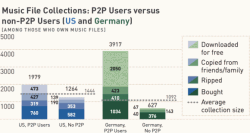Weekly News Roundup (21 October 2012)
Welcome again. Hard to believe 2012 is almost at an end. If the world is really going to end soon, then it does seem very quiet considering what is about to happen. The calm before the solar-flare-induced-mega-storms perhaps. While we wait for the obligatory twenty-storey high mega-tsunamis to arrive, the rise of Blu-ray continues unabated (I know, shit segue). The release of The Avengers on Blu-ray for the last week of September has allowed Blu-ray to post a record set of market share figures. For that particular week, 44% of all discs sold in the United States were Blu-rays, with The Avengers movie itself getting a Blu-ray sales share of 71.65%, selling more than 2 copies on Blu-ray or Blu-ray combo for every DVD version sold. There are still a couple of big releases coming, and with the holidays tending to favour Blu-ray over DVD if recent trends hold, the magical 50% mark may very well be broken in 2012. As long as the world doesn’t end before then.
An okay-ish news week, not too much, but a few interesting ones to waddle through. Let’s get started.

I’m a huge Star Trek fan, and one of the most remarkable things about the series, from the Original Series, to the barely bearable Enterprise, is how it manages titillate us with visions of how we can all benefit from future technologies (some of which have even become reality, for example the earlier communicators and flip phones, or more recently, the Padd and iPad). Having grown up with The Next Generation, the technology that excited me the most (other than the Holodeck, which was an offshoot of the same technology) was the replicator. To be able to create matter from energy, and thus be able to create anything you want at the touch of a button, is to me, the holy grail of science and a technology that will change the way everything works.

3D printing could solve world hunger and make a medical breakthrough one day, but DRM is casting its shadow on yet another promising technology
So the emergence of 3D printing, for me, is an exciting one. While the current generation of 3D printers are severely limited in scope in relation to what they can and cannot create (remember back to the first ever 2D printer, and how limited they were compared to printers of today), it feels like the start of something new and brilliant. And when The Pirate Bay launched their “physibles” section, to allow schematics to be shared, downloaded and printed, with their altruistic, perhaps right now unrealistic aim of being able “print food for hungry people”, it seems that we might be heading towards something really exciting.
And then reality sets in.
This week, a company headed by a former Microsoft CTO has been granted a patent that will add DRM to physibles, to prevent the unauthorised printing of everything from plastic toys, to edible foods, even to human skin. The terribly exciting future has just been shacked to the horribly restrictive past.
Just imagine, Captain Picard ordering a cup of Tea, Earl Grey, Hot, and instead of a cup of delicious tea appearing, the English tea drinking Frenchman is instead asked to key in the serial number for both the tea and the cup it comes in, before waiting for the ship’s computer to receive, via subspace, the authorisation unlock code that would permit good old Jean-Luc to be able to finally enjoy his cup of tea. Of course, the created objects would just have to be programmed, within its molecules, to self-destruct or to do something even more horrible if Picard does not return the items promptly back to the replicator for disassembling after enjoyment, as this is a condition that’s been written down in the 60 page license agreement that Picard had to agree to before being allowed to even order the drink.
Even the Ferengi aren’t that avaricious, I suspect.

People who pirate a lot of music, have more music and buy more music. Not rocket science, but still doesn’t seem to be well understood within the music industry.
To the credit of the music industry, they moved on from DRM pretty quickly, if not quietly. Although it’s probably something they still regret to this day. What they haven’t moved away from is their desire to punish their enemies: the music downloaders that they call “thieves”. But a new comprehensive study has found that, perhaps to the surprise of only the music industry themselves, people who pirate a lot of music are also the music industry’s best customers.
There seems to be this idea that there are two mutually exclusive groups of people, downloaders and buyers, when in reality, people who buy also download. And if you think about it, it isn’t all that surprising that people who download a lot of music actually love music, probably more so than people who don’t download as much. And music lovers buy more music.
And this is where I think the industry’s anti-piracy strategy fails, because by trying to kick pirates off the net, they may end up keeping their best customers from being able to continue buying. The correct strategy, in my opinion, starts with identifying the reasons why people that buy a lot of music also chooses to download some of them at the same time. It will be a complicated answer, but I don’t think it’s in anyone’s interest to simply labels these people as “thieves”.
Do they only buy content that they’re sure is “good”, and use piracy as a way to discover new content (might this explain why for music, Spotify is doubly good in allowing people to use it instead of piracy to discover music, and at the same time monetize the free streaming)? Did they simply run out of money and did not want to stop experiencing new music? Is it an issue of availability, ease of use? The answers to these question should then determine what the anti-piracy strategy should be.
The study also revealed that music downloading is actually a much smaller problem than traditional piracy methods, including sharing with friends/family and good old CD ripping. This corresponds with the RIAA’s own research on the matter and it kind of makes a mockery of the claim that the music industry’s sufferings started with the emergence of the Internet. You do have to wonder if there’s another agenda in play for putting so much focus on the web piracy, rather than just a major case of scapegoating. Perhaps by exaggerating the Internet piracy problem, the industry can get policymakers to step in and help protect their dying business model. And perhaps the right lobbying will also give the industry more control over content distribution on the Internet to ensure a bigger than warranted slice of any eventual pie.
And in the eagerness of help, policymakers ended up creating copyright laws that either don’t reflect real world situations, or are so heavily biased, cause everyone to become hysterical about the whole thing. ISPs and web hosts have been the front lines of this war, unfairly so in many cases (ISPs are no different to telephone companies, and web hosts are akin to landlords that rent store-fronts to businesses – neither of them should be made liable for what their customers/tenants get up to, especially when they cannot be aware of what’s going on without taking extraordinary measures, such as spying on their customer/tenants). And their fear of getting sued has allowed some ridiculous situations to develop.
Just this week, web host ServerBeach deactivated an account hosting 1.45 million educational blogs because of a single DMCA notice for a single page on just one of these blogs. This particular example may point more to a communications breakdown between web host and client, as opposed to being simply a case of copyright hysteria, but ServerBeach’s written DMCA policy still seems to be a case of deactivate first, ask questions later. ISPs and web hosts need to know their “safe harbor” rights, and should be willing to defends these rights even as rights holders try to water it down to suit their own agendas.

The Pirate Bay moves to the cloud to create a more resilient, more raid-proof version of the website. Source methodshop.com @ Flickr, Creative Commons
And if web hosts can get into a tizz about a single link on a single page on one of 1.45 million blogs, then you do wonder sometimes how the hell The Pirate Bay manages to find web hosts willing to host their stuff. But the TPB folks seems to be well aware that this is either already a problem or will be in the near future, and so they’ve turned to the mythical cloud for their solution. Moving The Pirate Bay’s website to the cloud does seem like the most sensible thing to do for the website that’s often the target of law enforcement, and also victims of their own success (being so popular and all, the logistics of keeping the website online, on a budget, cannot be easy).
By using virtual machine instances on cloud providers in different countries, and with everything to and from the cloud encrypted (un-snoopable, and with the cloud provider probably not even aware of what is actually being hosted), a new layer of resilience, privacy and security has been added, and all apparently for a lower cost than before. If one cloud provider goes down, another can be sourced easily and a new instance can be made up and running in short order. Replicate this that a couple of times more, and trying to kill TPB would then be as difficult as slaying the mythical Hydra – cut off one head, and two more will take its place.
All the unwanted attention that TPB has be getting, with authorities trying to trap the elusive website with ever more elaborate mousetraps, seems to have only produced one thing: a better mouse!
And now for the best part of the WNR – the end of it! See you next week.
